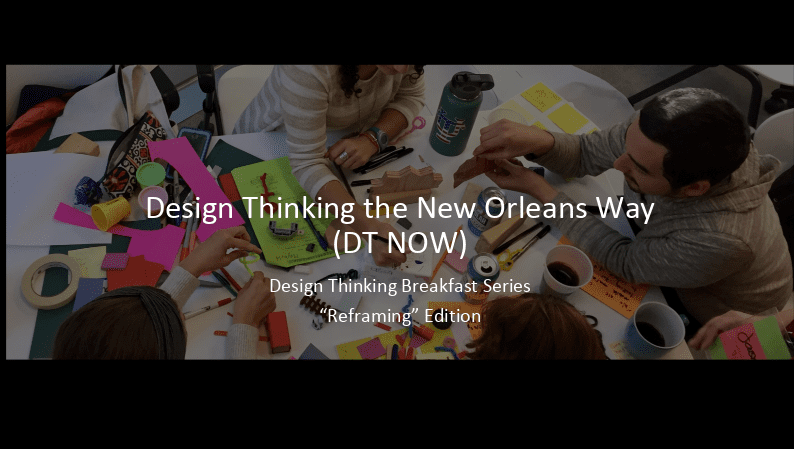
Máille Faughnan leads session on(re)framing practices in design thinking
On Friday, May 15, 2020, I led a session on (re)framing practices in design thinking for the monthly Design Thinking the New Orleans Way virtual breakfast series.
The purpose was to invite participants to reflect on how we can “frame” issues from different perspectives. The framings we choose stem from underlying mental models, delineates boundaries and advances certain narratives about an issue. This ability to recognize our framings and try on new ones is central to design thinking. How we define problems shapes our design solutions, and how we shape solutions is an exercise of power.
To highlight the implications of different definitions, I started the session with an example particularly relevant to me: the framing of racism versus white supremacy as a social problem. As a white person, compelling resources in recent years have encouraged me to adopt the latter framing in personal and professional anti-oppression work (e.g., see Decolonizing Wealth by Edgar Villanueva). Seeing the problem as racism can allow me to locate the issue “out there” and not with myself, because we as white people are socialized to believe we don’t have a race. Seeing the problem as white supremacy places whiteness, feelings of dominance and institutionalized power imbalances at the center of the problem, reminding me that I am the one benefitting from and often perpetuating systemic racism.
To practice the power of (re)framing, participants then played with problem definitions for a hypothetical design challenge: reimagining our online learning experiences as students and professionals during the COVID-19 pandemic. I chose this design challenge because they were already having this experience, and thus had preliminary design research to tap into (while advising them to proceed with caution and not focus solely on their own experiences). Participants practiced various well-known design techniques that I like to call “sabotage” (imagining the worst scenario), “werewolf” (adopting a really unique perspective), and more to explore new framings. Groups envisioned compelling new pathways, such as finding “opportunities” by leveraging what learners already have access to (e.g., mobile phones), taking inspiration from “analogous situations” like eHarmony and speed dating experiences, and “simplifying” the problem by removing the assumption that distance learning has to happen online.
We ended the session by crowd-sourcing advice on problem framing from our participants:
- Try on multiple techniques and framings for a design challenge, even as a thought exercise
- Reframe after design research to draw from a greater data set, and before design research to draw out your assumptions
- Work intimately in small groups
- Mirroring the Theory U process: take a pause in brainstorming (i.e. meditate) to let ideas rise to the top
- Practice to become more agile in working with different framing
Download and view the slides (pdf) to learn more about framing, the techniques participants practiced and other ideas the group came up with.
Máille Faughnan is an Instructor in the Tulane School of Architecture’s Social Innovation and Social Entrepreneurship minor and Taylor Center Research and Scholarship Fellow.